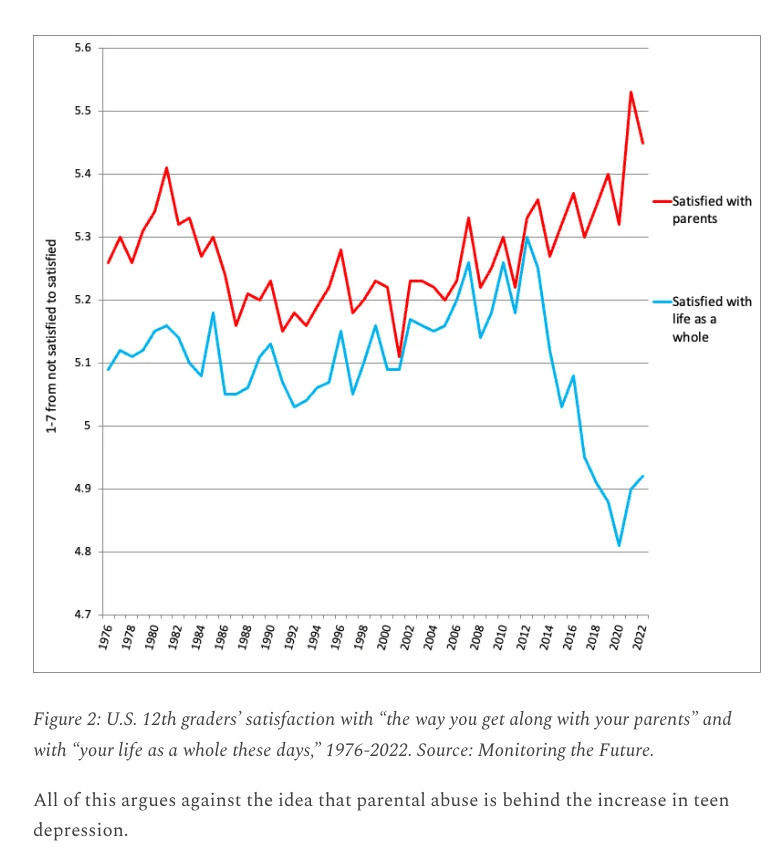Purposelessness—Not Social Media—is Causing Our Kids' Depression

Social media started around 2012, which is precisely when we saw our kids’ mental health drop into an abyss >. But nobody has been able to clearly articulate exactly how social media is causing it. Nor why it crushes some kids while barely affecting others.

Jonathan Haidt shows it’s not the relationship with parents
I believe I have the answer. Or at least the primary answer.
It’s not Social Media causing the depression. Social Media is causing Purposelessness, and the Lack of Purpose is causing the depression.
Comparison as the thief of joy
The common narrative we hear about social media’s negative influence is that of comparison. Young kids, especially girls, are shown images of the gorgeous, famous, and happy, and they compare that to their own lives and are devastated. Repeatedly. All day, every day.
That’s bad, for sure, but I don’t think it’s quite it. That’s more like the kindling or the match, but not the fire.
❝When you lack Purpose, it’s hard to know which lifestyles to emulate and which to discard.
The problem is that social media is sending multiple conflicting messages for what that young person should be.
You should be beautiful
You should be tall
You should be a YouTuber
You should be a model
You should be an influencer
You should be a singer
You should be attractive and popular
Kids and teens are supposed to be forming their direction in life as they grow up. Figuring out where they’re going and what they want to be. But that little voice inside them is quiet, and it gets drowned out by the persistent and convincing messages from social media.

Another thing that’s making it worse is that parents are simultaneously sending less of their own signal of what the kid should be.
Parents used to largely tell kids who they were, and what they should be. Maybe they’d give some options, but it was clear that they should at least be:
Someone who believes in God
Someone who loves their country
Someone with a trade or education
Someone with a job in their trade or field
Someone with their own family and career
In other words, most people knew from the time of childhood on, who they were and what their purpose was. It was to be a patriotic and god-fearing electrician, or housewife, or teacher. Or whatever.
Super simple. Super clear. At the same time, the false purpose signals were few and relatively quiet. They didn’t have social media—or media in general—showing them thousands of alternatives a day.
❝Telling a child they ‘can be anything’ doesn’t help them find themselves, or their path forward.
Today we have the opposite.
Today, parents provide much less purpose, while social media pulls the kids in a million different directions. And the result is that they’re they’re lost. They don’t know who they are, who they should be, or why they’re even here.
Parents and schools—trying to be encouraging—are more likely to say things like, "You can be whatever you want." It’s a positive sentiment, but by itself doesn’t give them the direction they need. And it might even make it worse because it implies they should be able to figure it out for themselves.
The explanatory power of the Purpose Problem
This Purpose Problem model explains so much.
It explains why some people are seemingly immune to social media’s negativity
It explains why religion offers so much help to so many
It explains why kids were much happier in the past
It explains why many people struggle with addiction and can’t have a single taste of a drug without spiraling out of control, while some could do three weeks of the hardest drugs possible and go back to regular life and never think about the drugs
And it explains why many kids in immigrant families have some immunity
In all five of those cases, the difference is purpose.
Kids are resistant to social media when they have a stronger purpose from something else
Religion often gives people a strong identity and direction
In the past they got this purpose from parents and religion
Addiction can be seen as a lack of connection and purpose that makes drugs and escape attractive
And immigrant families often do two things simultaneously: giving lots of direction and purpose themselves, while also limiting their kids’ exposure to outside influence
That’s what matters. Having a purpose that is stronger than all the false signals constantly bombarding us day to day. Signals telling us what we should be. Things like:
You have to be rich
You have to be pretty
You have to be famous
That other person is doing better than you
You’re not as popular as that other person
That person has everything in life, and I have nothing
They’re so happy, and I’m so not
These are all signals pulling kids in multiple directions. They obscure and reduce their internal voice, or stop them from developing one at all.
And the result is devastating. It makes kids feel like everyone around them has it figured out—except for them. And that disconnect—that feeling of isolation—is what makes life unbearable.

Ok, but what do we do?
The solution is simple but not easy.
We have to make sure our kids have a purpose that’s stronger than the external signals they’re receiving.
We can do that in two ways:
Magnify their primary purpose signal
Reduce their exposure to false purpose signals
I’m sure there’s some minimum that the primary signal needs to reach, but don’t worry about that so much. Worry about the ratio. Make sure their primary signal is way stronger and more consistently reinforced than the noise.
Practically speaking, this means helping them find and lock onto a direction. They’re kids, so you can’t just ask them deep philosophical questions about self. When I was a kid I was mostly about boogers and BMX. They’re young.
❝Few things make you stronger than knowing who you are and what you’re about.
So it’s about creating a distant goal of self. A thing they are becoming. You want them thinking something like:
I’m going to be a mother and a doctor and help people by writing reading and doing YouTube
I’m going to be a father and a restorer of trees on the planet
I’m going to be a physicist like my mother and my uncle
I’m going to be…something
Something. Something distant. Something grand. Something they can claim as an identity to immunize them against the garbage assaulting their minds every day.
I obviously don’t know what that something is, as it’s different for every kid and every situation. And it might take a while for you to figure out with them. Plus, it might not even matter much because it’s likely to change.
What matters is that it feels legitimate, strong, and tangible enough to lock onto and define them during these chaotic years.
Summary
It’s not social media causing depression in our kids.
It’s the lack of Purpose.
Social media looks guilty because it’s the main thing sending false purposes, false identities, and pulling kids in multiple directions.
This means they can’t nurture their inner voice that’s still quiet, so they end up with no direction and no purpose—which means no identity.
They then (falsely) see that everyone has life figured out—except for them—and they start questioning why they’re even here.
To solve this, we must 1) help them find and magnify their own signal, and 2) reduce negative external signals, such as social media and other forms of comparison.
In short, kids are so depressed because they don’t know who they are or what they’re supposed to be doing.
And our primary purpose, as adults, needs to be helping them figure that out.
NOTES
BONUS: This is also—in my opinion—the main reason for adult depression as well. Turns out, adults are grown-up kids. Also, it’s much harder to guide someone about purpose when you don’t have one yourself. So the lack of purpose we’re currently seeing is moving forward in time and subsequent generations :(.
To be fair to parents, it’s also harder to give a defined purpose today because it’s far less clear than 20 years ago that our country, God, an education, or a career will yield any sustainable meaning or happiness. It’s less clear that God exists. It’s less clear that the US or the West is a force for good. It’s less clear that an education is a guarantee of happiness. It’s less clear that a good job or career is a guarantee of happiness. See: layoffs. See: AI. So it’s far harder than 20 years ago to tell a kid to pursue those things and you’ll be happy. So what do you tell them? Not easy.
This is why so many kids of recent Asian and African immigrants, especially of the Helicopter variety, are less prone to social media depression. They’re too busy. They’ve been told what their purpose is, and they’re fully engaged in pursuing that. They’re in study groups with other people who have the same mentality. They’re in sports groups. They spend their whole day thinking about what they are becoming, and working towards, and with other kids doing the same. This doesn’t make them immune to depression, but it provides a lot of defense. And it doesn’t have to be perfect to do the job. The purpose doesn’t have to be exact (and it can’t be anyway since they’re just kids). What matters is that it’s a much stronger signal than the noise.
There is a lot of great work being done on the social media aspect of this by Jonathan Haidt, and specifically on the topic of getting phones out of schools, which I recommend you check out. MORE >